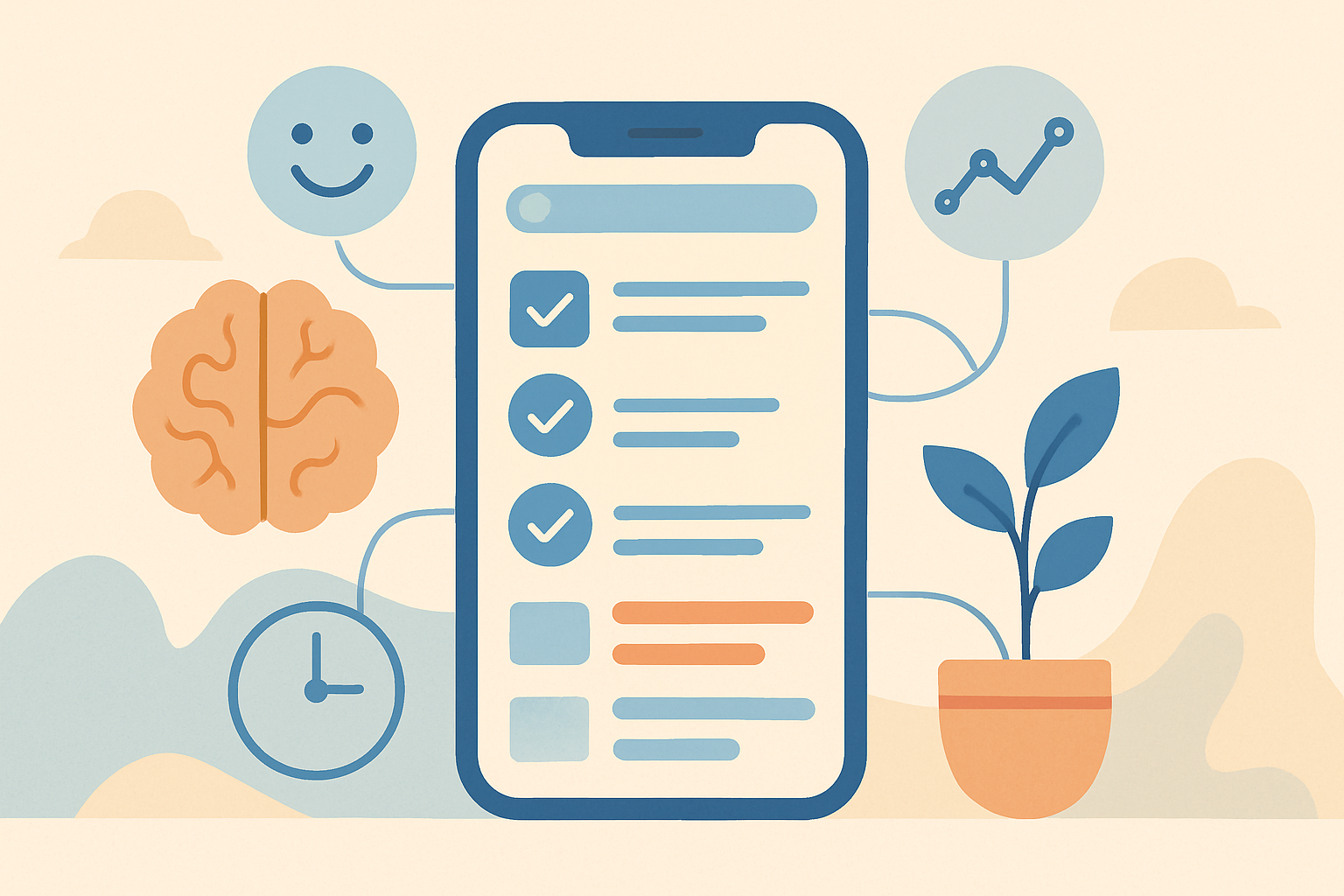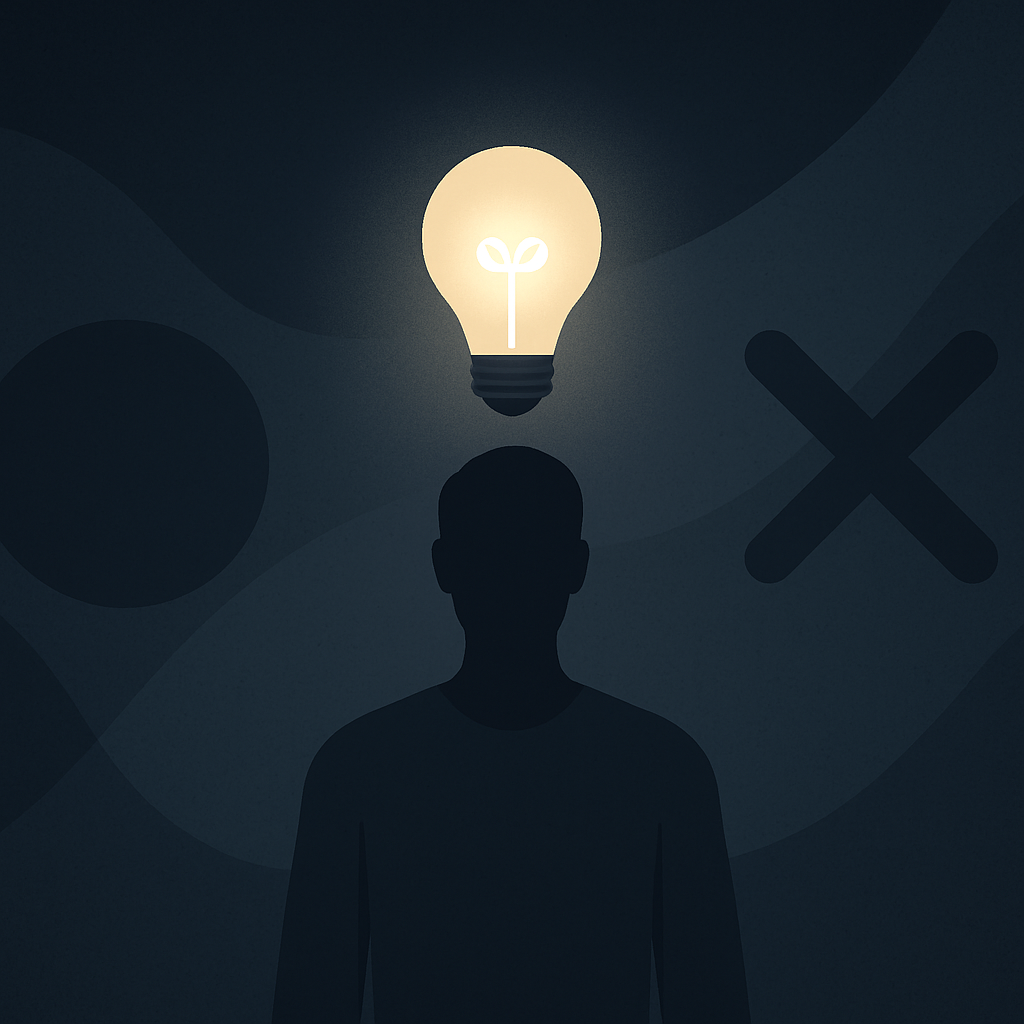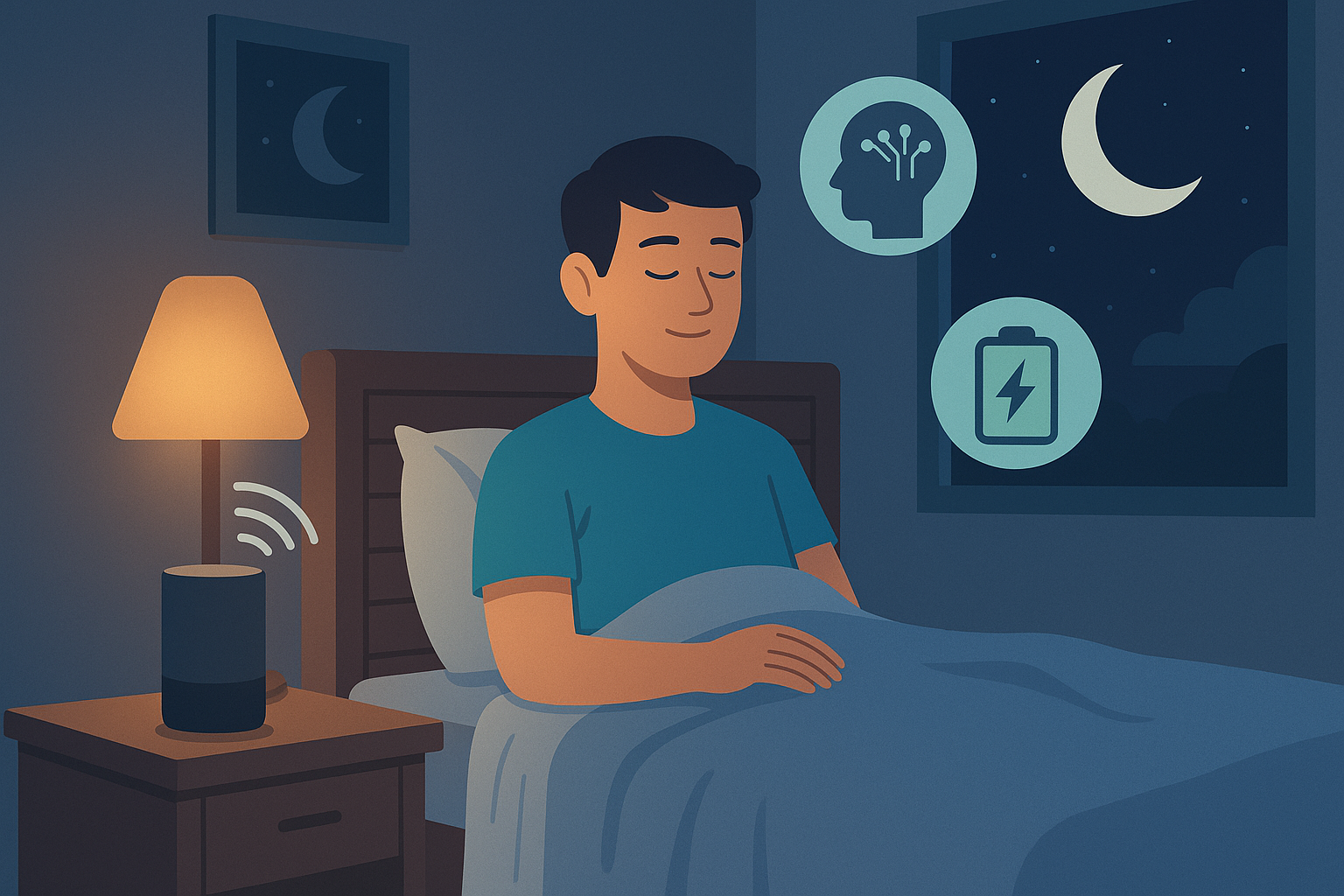We live in an age of endless data — steps, calories, hours worked, sleep cycles. But the real revolution isn’t in tracking more, it’s in tracking smarter.
Artificial intelligence is turning self-improvement into a system that learns, adapts, and even predicts. Habits
When you connect AI to your daily life, your habits and mood stop being random events — they become signals.
And those signals, once interpreted, tell you exactly how to live better.

From Habits Tracking to Understanding
Traditional habit tracking requires effort: opening apps, checking boxes, and manually logging moods.
Over time, this friction breaks consistency — the same reason most people abandon their self-improvement systems after a few weeks.
AI eliminates that barrier.
Instead of tracking manually, it observes patterns automatically — through wearable data, writing tone, or digital behavior.
Example:
An AI journaling tool analyzes your daily entries in Notion or ChatGPT. It detects emotional tone, word frequency, and sentiment, then visualizes mood trends over time.
Meanwhile, your fitness tracker or smartwatch provides contextual data like activity level and sleep quality.
The system merges both — emotional and physical — into a unified view of your habits and well-being.
The Science of Habits Meets Machine Learning
Habits form through repetition, but awareness drives consistency.
AI brings that awareness into focus by turning behavioral psychology into data-driven insight.
It doesn’t just record when you act — it learns why you act.
| Habit Data | AI Insight | Suggested Adjustment |
|---|---|---|
| Irregular sleep times | Circadian inconsistency | Set adaptive bedtime cues |
| Screen use before bed | Reduced melatonin | Trigger device dimming |
| Mood drop after meetings | Social fatigue pattern | Schedule recovery breaks |
| High productivity after exercise | Dopamine correlation | Reinforce post-workout focus |
This creates a loop of feedback: observe, learn, refine, repeat.
You’re no longer guessing what works — your AI already knows.
How AI Tracks Habits Without Effort
Modern AI systems collect signals from multiple sources — calendar activity, movement, tone, and interaction frequency — then create a holistic profile of your behavior.
Example:
- Your phone detects walking or sedentary periods.
- Notion AI identifies focus patterns in written reflections.
- Reclaim AI syncs with your schedule, showing when work intensity peaks.
- Oura or Fitbit records sleep recovery and heart variability.
Together, these inputs form a detailed map of your daily rhythm.
AI recognizes when you’re consistent — and when you’re not — often before you notice.
The power of this automation is invisibility: the system works even when you forget.
The Emotional Layer: Mood Intelligence
Beyond physical data, AI is now able to interpret emotion through language, voice, and behavior.
Sentiment analysis allows algorithms to measure subtle emotional shifts — from motivation to burnout.
Example:
ChatGPT or Mindsera analyzes journal entries and detects a recurring pattern of stress around 4 PM.
It connects that finding with Reclaim AI’s meeting data and Oura’s heart rate metrics — revealing that emotional fatigue aligns with decision-heavy afternoons.
Your system then suggests shorter meetings or a mindfulness reset block.
AI doesn’t just notice what’s wrong.
It teaches you why it happens — and how to adjust.
Example: A Day in Data
7:00 AM — Oura reports optimal recovery.
9:00 AM — Notion AI records strong motivation through tone in journaling.
2:00 PM — Reclaim detects focus decline and inserts a 15-minute reset.
8:00 PM — ChatGPT summarizes the day: “Energy peaked at noon; mood dipped after long calls. Try shifting deep work earlier tomorrow.”
No alarms. No manual logging.
Just awareness, automatically delivered.
Tools That Make It Possible
AI habit and mood tracking depends on seamless integration.
Here are tools that already work together:
| Tool | Function | Ideal Use Case |
|---|---|---|
| Oura / Whoop | Sleep and recovery tracking | Physical health data |
| Notion AI | Reflective journaling | Emotional context |
| Reclaim AI | Adaptive scheduling | Focus patterns |
| ChatGPT / Mindsera | Mood insight & analysis | Mental performance |
| Fitbit / Apple Health | Activity tracking | Habit consistency |
These systems don’t compete — they complement.
Their combined intelligence creates a personal awareness network that evolves with you.
The Power of Pattern Recognition
The most profound change AI brings to self-improvement is pattern visibility.
Instead of relying on intuition, you get objective mirrors of your behavior.
Over weeks, the data reveals things you never noticed:
- You’re most creative on Tuesdays.
- Your stress rises when sleep drops below 7 hours.
- You skip workouts when meetings exceed three hours.
Once visible, change becomes simple — because clarity always precedes control.
How AI Turns Data into Change
Raw information means nothing without meaning.
AI transforms tracking into transformation by generating personalized insights.
It identifies triggers, adjusts feedback loops, and even rewards consistency through gamified dashboards or daily briefings.
You’re not following a plan — you’re co-creating it with your system.
Example:
Notion AI combines your weekly reflections with Reclaim’s schedule and generates a “habit alignment report,” highlighting where your actions match your goals — and where they don’t.
It’s the closest thing to having a personal data-driven coach — one that never forgets.
The Future of AI Habits and Self-Awareness
By 2026, personal AI systems will unify health, productivity, and emotion into one cognitive dashboard.
They’ll sense not just what you do, but how you feel doing it — predicting burnout, adjusting rest, and guiding you toward equilibrium.
Your habits and emotions won’t live in separate apps anymore.
They’ll coexist in one intelligent reflection of who you are — and who you’re becoming.
Conclusion
The goal of tracking isn’t control. It’s understanding.
When AI observes your habits and mood, it builds awareness without effort — helping you design better days and better decisions.
The real transformation doesn’t come from the data itself, but from what you see once it’s organized.
You no longer have to guess what’s wrong or right.
Your system already knows — and it’s teaching you, one habit at a time.
Further Reading & Related Insights
Internal link:
- The Art of Saying No — Powered by AI — Learn how AI protects your focus and creates space for what matters most
- External links:
- Oura Ring – Sleep and Recovery Tracker
- Notion AI – Smarter Journaling and Reflection
Blog
This section provides an overview of the blog, showcasing a variety of articles, insights, and resources to inform and inspire readers.
-

AI Habit Tracking and the New Rhythm of Modern Self-Improvement
AI Habit Tracking. Progress used to depend on discipline. Now, it depends on data.…
-

AI Decision Making and the New Discipline of Intentional Living
AI Decision Making. Every “yes” has a cost. Every time you agree to something…
-

The Perfect AI Night Routine to Sleep Better and Think Smarter
AI Night Routine. Your morning doesn’t begin when you wake up — it begins…
